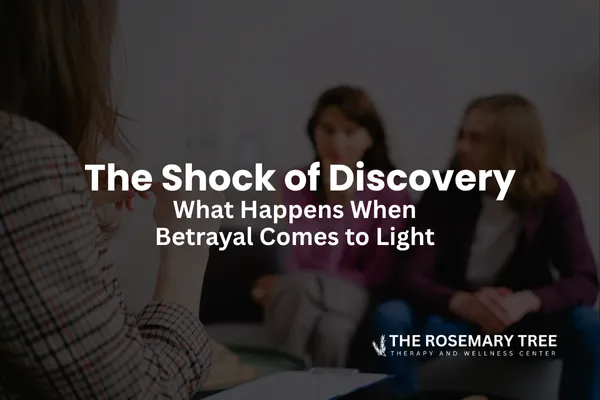
The Shock of Discovery: What Happens When Betrayal Comes to Light
When Everything Changes in a Moment
The discovery of betrayal is one of the most painful experiences a person can face. In an instant, the world you knew can feel like it has disappeared. Nothing seems steady, and even familiar spaces can feel unsafe.
The betrayed partner often experiences shock that feels physical, nausea, shaking, or disorientation. The partner who caused the harm may feel frozen, guilty, and unsure how to respond without making things worse.
This is the moment when emotions are at their most intense, and decisions made in panic can cause lasting damage. Before anything else, the goal is stabilization.
Understanding the Shock Response
When betrayal comes to light, your nervous system interprets it as a threat to your survival. The body releases adrenaline and cortisol, activating the same systems that protect you from danger.
You may notice:
Racing thoughts or trouble focusing
Physical tension, shaking, or nausea
Feeling detached or unreal, as though watching from outside yourself
Intense crying, anger, or numbness
Difficulty sleeping or eating
These are normal trauma responses. They do not mean you are weak or incapable. They mean your body is trying to protect you from unbearable pain.
Why Clarity Is Impossible in the Beginning
In the early hours and days after discovery, couples often feel an overwhelming urge to act, to confront, to separate, to demand every detail, or to make permanent decisions.
But the truth is, your mind is not ready for clarity yet. The part of your brain responsible for reasoning and decision-making temporarily shuts down when you are in emotional shock. That is why things may feel foggy or out of control.
The goal during this stage is not to find solutions. It is to slow down and protect your ability to think clearly later.
What Stabilization Looks Like
Stabilization is the first step toward healing, and it begins with safety, both emotional and physical.
For the betrayed partner, that may mean:
Taking space to breathe and calm your body
Reaching out to a trusted friend or therapist
Limiting exposure to triggering details or confrontations
Focusing on nourishment, rest, and grounding
For the partner who caused the betrayal, stabilization means:
Avoiding defensiveness or explanation in the early stage
Respecting the other person’s need for space
Taking responsibility without pushing for forgiveness
Beginning to regulate your own emotions so you can respond with care
Both partners need space and stability before diving into discussions about what happened or what comes next.
Why Safety Must Come Before Discussion
Talking too soon about details or next steps can create more harm than healing. When emotions are heightened, words can feel like weapons. You may both leave those conversations more hurt than before.
Creating a pause is not avoidance, it is wisdom. It gives both nervous systems a chance to settle, so you can later communicate with compassion instead of survival instincts.
How Therapy Intensives Help During the Shock Phase
Our Accelerated Deep-Work Therapy Intensives were designed specifically for moments like this, when couples are in crisis and need structure, guidance, and safety.
During an intensive, you will have extended time with licensed clinicians to:
Understand what is happening to your body and mind during trauma
Learn stabilization and grounding techniques
Explore emotions safely, without re-traumatization
Begin identifying what immediate support you need
Create a plan for the days and weeks ahead
When you are overwhelmed, you do not need to fix everything, you need someone to help you hold it.
What Healing Begins to Feel Like
In the days and weeks after discovery, healing begins with very small shifts. You might notice:
A moment of calm breathing after panic
The ability to rest for a few hours
Feeling a little more grounded when speaking
Recognizing that you do not have to face this alone
These moments are signs that stabilization is working. Healing does not mean forgetting, it means finding safety in the present moment again.
Final Thoughts
The shock of discovery can make it feel like your world has ended, but it is the beginning of a new chapter, one where truth, healing, and safety can take root.
You do not have to face this alone. You can reach out to us here, and a member of our team will connect with you to talk through what this process could look like. There is no pressure, only care and support as you begin finding your footing again.


